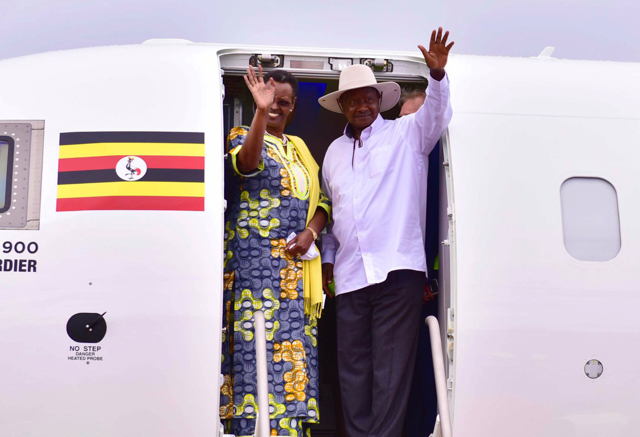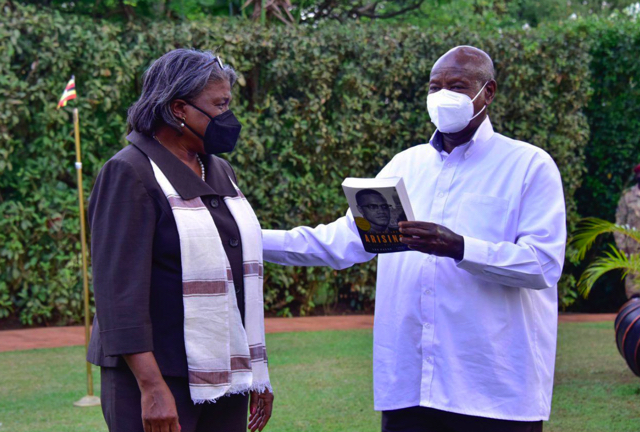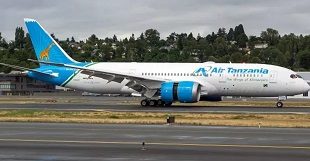
Will he turn on the charm or signal end of schmoozing?
Kampala, Uganda | THE INDEPENDENT | U.S. President Joe Biden has invited 49 of 54 African leaders for a three-day summit scheduled for 13-15 December. Not invited are Burkina Faso, Guinea, Sudan, Mali, Eritrea, and Western Sahara.
This means that President Yoweri Museveni has got an invite in spite of earlier questions about whether he would make the cut since many of his state apparatchiks have recently come under a slew of travel and financial sanctions by the U.S. For example, Zimbabwe did not receive an invitation at the foreign minister level, given U.S. sanctions against other members of the government.
There has also been an impression that Museveni, who for years was viewed as America’s man in the volatile east and horn of Africa countries has become increasingly sidelined if not snubbed.
The Senior Adviser for Africa at the White House National Security Council, Dana Banks, told reporters at the White House in Washington DC on Nov. 22 that the invites were based on criteria used by the African Union. Only countries that were suspended by the AU over military coups, were not recognized by the U.S. or did not have embassies were not invited.
“In our rubric for the – for extending invitations we followed our African Union sort of colleagues as a guide in terms of inviting those countries who are in good standing with the African Union,” Banks said.
After appearing as the vanguard of presidents who were termed “the new breed of African leaders” in the mid to late 1990s and emerging in the early 2000s as the leader on the American war on terror on the Africa front, Museveni has been sliding off the global geopolitical compass in recent years.
Now it appears Museveni could once again strut the global stage thanks to renewed American interest in the continent as Washington stares down a rising China with wide African tentacles.
“We are not asking our African partners to choose,” an American official told Reuters when the summit was first announced in July. “We believe the United States offers a better model, but we are not asking our African partners to choose.”
Vice President Kamala Harris also spoke about America’s hopes from the summit.
“Our Administration’s goal,” she said, “is to promote inclusive and sustainable economic growth and development across the continent, to expand capital flows, and to promote the vibrant spirit of entrepreneurship and innovation that is so prevalent across Africa.”
Invitations for African leaders to convene in world capitals have become regular features on the diplomatic calendar. The France-Africa Summit, an annual event since 1973, and periodic Tokyo International Conferences that began in 1993, have now been joined by similar gatherings in China, Turkey, India, Russia, various European Union capitals and the United Kingdom. U.S. President Barack Obama hosted African leaders in 2014, and now President Joe Biden is following suit with the second U.S.-Africa Leaders Summit in Washington DC next month.
The U.S.-Africa Leaders Summit is billed as a business meeting with trade, investment, jobs set to take centre stage and the inevitable political maneuvers careful concealed.
One of the summit objectives on the administration’s list is to “amplify diaspora ties.” This involves focusing on Africa’s youthful diaspora in America as the engine of entrepreneurship and innovation and Day One of the Summit will feature the African and Diaspora Young Leaders Forum. Focus will be on higher education, workforce development, creative and innovative industries, environmental equity, partnerships and a sustainable future.
There will also be a civil society forum, a peace, security and governance forum for representatives of development, defense and diplomacy arms, and an African Growth and Opportunity Act (AGOA) ministerial, and a health ministerial, and a U.S.-Africa civil and commercial space forum to talk about shared objectives on the climate crisis, promoting responsible behavior and strengthening cooperation on science and commercial space activities, and on food security and food systems. Foreign ministers will convene on supporting conservation, climate adaptation and a just energy transition.
Day two of the Summit is devoted to business, with business and government leaders, CEOs and the President’s Advisory Council on Doing Business in Africa talking about shared policy priorities and catalyzing two-way trade and investment.
Leader-to-leader discussion will be on Day three of the Summit under the rubric of the seven aspirations for the #theAfricaWeWant outlined in the AU Agenda 2063 documents. African leaders will address President Biden on their countries priorities, multilateral networking, and getting a greater African voice in global matters.
It is anticipated that President Biden will be able to engage both formally and informally with the leaders during the Business Forum on Day Two, at a dinner gala on same day, and the leader-to-leader session on Day Three.

Museveni’s position
President Museveni’s position in the American pecking order appeared unclear when in July U.S. Secretary of State Anthony Blinken skipped Kampala on his three nation tour of South Africa, the Democratic Republic of the Congo (DRC), and Rwanda. It had been expected that Blinken, who had earlier in November 2021 raised eyebrows when he stopped in Kenya before heading to Nigeria, and Senegal, would call on Kampala.
July was when America and Russia were courting African countries over a vote against Russia over the Ukraine war at the United Nations and Moscow’s top diplomat, Foreign Minister Sergey Lavrov had just completed a lobbying jaunt to Kampala.
Instead of Blinken, President Museveni played host to Linda Thomas-Greenfield, the U.S. Ambassador to the United Nations.
Thomas-Greenfield is very senior as she served as Assistant Secretary of State for Africa during President Obama’s second term and is said to have the most African experience and knowledge in the Biden cabinet. She also announced $20 million in new funding for refugee programs in Uganda. But hosting Secretary Blinken would have cemented Museveni’s credentials in the American orbit.
Back in Washington, Thomas-Greenfield described how she visited a grain mill in Uganda that before the war was getting 40% of its wheat from Ukraine.
“I heard them facing shortages and high prices. Farmers expressed concerns about the high price of fertilizer. The price had more than tripled for these farmers. One told me that he would normally have planted 10 acres. He was only planting four, because of fertilizer shortage. Another woman who was a farmer told me that she normally would have planted five acres, and she was only planting one acre,” she said.
“I also saw that people were delighted to see us there, because, as you know, on the heels of my trip, Secretary Blinken arrived in South Africa and visited DRC (Democratic Republic of Congo) and Rwanda. (USAID head) Samantha Power had been in Malawi and in the Horn previously. The active engagement by American leaders was welcomed on the continent. I felt it personally, arriving in Ghana and Uganda and Cape Verde, in the way that I was received by leaders,” she said.
She added: “I think there was a sense, certainly over a period in the prior administration, that we had forgotten Africa. And there was a sense of welcome that we were back. I think there was confidence that Africans felt, that these leaders felt, that they could depend on our commitment, on our word, and on what we can deliver.”
Speaking specifically about the U.S.-Africa Leaders Summit, she said American is keen to hear what programs African leaders want to do jointly with America. She said security is definitely on the agenda, together with democracy.
“We’re seeing a lot of backsliding, particularly in West Africa, on democracy,” she said.
“I think the summit is going to be a huge effort on our part to start the process of recalibrating, but also to really strengthen what is already a solid relationship that we have on the continent,” she said.

Museveni and America
By Nov.22, about 45 heads of state or heads of delegation had confirmed plans to attend and some heads of state indicated they would not attend in person. President Museveni’s situation was unconfirmed as we went to press. But his schmoozing with American presidents appears to have ended with Bush because his successor, President Barack Obama, did not visit Kampala in spite of high expectations that he would visit in 2009. Instead Obama visited Kenya and Tanzania in the region and South Africa, Senegal, and Ethiopia on the continent.
In his 36-year run as president, Museveni has dealt with the administrations of seven U.S. presidents stretching from Ronald Reagan in the 1980s to Joe Biden who is the current occupant of the White House.
President Museveni has had official meeting with some of the U.S. presidents either on the sidelines of the UN General Assembly in New York or on visits to the White House in Washington DC.
Then President of the U.S., Bill Clinton visited Uganda in March 1998 and later set up a charity called, Building for Tomorrow.
Former U.S. President Bill Clinton again visited Uganda in July 2012 while accompanying his wife, then-Secretary of State Hillary Rodham Clinton.
President Gorge W. Bush was the second to visit Museveni in Uganda in July 2003. The main concern was how to deal with conflict hotspots in the DR Congo and Sudan, the Joseph Kony Lord’s Resistance Army war raging in northern Uganda, and abuse of human rights in Uganda.
At the time, Uganda was the darling of the West and was constantly mentioned for Museveni’s success in resuscitating the once collapse economy and combating HIV/AIDS. On the regional front, Museveni was seen as a bulwark for the Christian West against the Islamic power in Sudan.
The Bush administration rewarded Museveni by placing Uganda on the list of countries eligible for preferential trading status under the African Growth and Opportunity Act (AGOA) even though its human rights performance, which was one of the criteria for qualification, was not good.
Following Bush’s visit, Museveni in 2005 restored the multi-party system in Uganda after 19 years of the no-party Movement system.
Museveni’s schmoozing days with American presidents, however, appear to be over. Vice President Jessica Alupo represented the country at this year’s UN General Assembly in New York.
But if he travels to Washington, President Museveni, 77-years old and the host Joe Biden, 80-years old, could end up as the oldest people in the room. Africa’s true octogenarians such as Paul Biya, 89, of Cameroon, Hage Gottfried Geingob, 80, of Namibia, and Alassane Ouattara, 80 of Ivory Coast, could also miss the event.
Some of Museveni’s age-mates, Teodoro Nguema Mbasogo, 79, of Equatorial Guinea, Emmerson Mnangagwa, 79, of Zimbabwe, Muhammadu Buhari, 79, of Nigeria, Nana Akufo-Addo, 78, of Ghana, Abdelmadjid Tebboune, 76, of Algeria, and Ismail Omar Guelleh, 74, of Djibouti are equally doubtful.
From the Barack Obama administration, Museveni has come under attack from successive American presidents over his perceived poor human rights record, including on the treatment of minority LGBTQ community in Kampala. But Museveni is a known charmer on the international stage. It remains to be seen how his interaction with Joe Biden will turn out.

****
 The Independent Uganda: You get the Truth we Pay the Price
The Independent Uganda: You get the Truth we Pay the Price



Kudos to mr Y.K.M.T our astute leader i wish you well in the US……….#proudest ugandan……